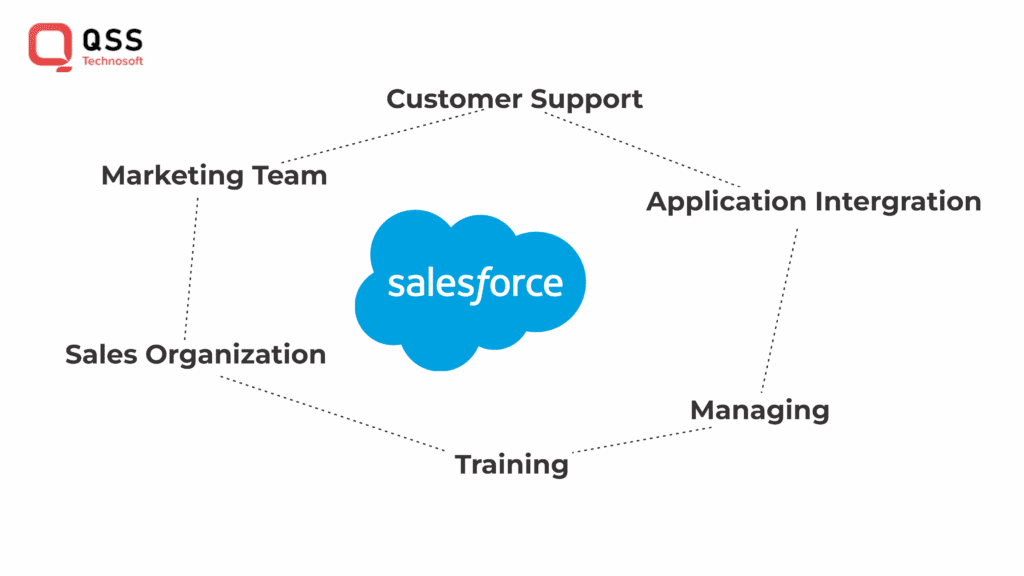Have you ever wondered how businesses effectively manage and nurture relationships with their customers to drive profitability? Well, let me introduce you to Customer Relationship Management (CRM), a vital aspect of any successful business strategy. CRM involves the strategic management and nurturing of customer relationships to maximize their satisfaction and ultimately boost profitability. Did you know that implementing a CRM system can increase customer retention rates by as much as 27%?
One leading CRM platform that is revolutionizing the way businesses approach customer relationship management is Salesforce. With over 150,000 customers globally and a market share of 19.5%, Salesforce empowers businesses to streamline their communication, automate processes, and deliver personalized interactions to enhance customer experiences.

To better understand the impact of CRM systems, consider this example: a telecom company was able to reduce customer churn rate by 30% through implementing a CRM system, resulting in significant revenue growth. With the power of CRM, businesses can forge stronger customer connections, drive loyalty, and ultimately achieve sustainable growth.
In this blog, we will read and understand more about The Role of Salesforce in Customer Relationship Management (CRM)
What is Salesforce?
Salesforce is a cloud-based CRM platform that offers a wide range of tools and functionalities to manage and improve relationships with customers. It provides organizations with a comprehensive view of their customers, helping them track, analyze, and enhance customer interactions across multiple channels.
From sales and marketing to customer service and support, Salesforce caters to various departments within an organization, offering a holistic approach to customer relationship management.
FOR EXAMPLE: Microsoft is a multinational technology company that uses Salesforce as its CRM platform. They have implemented Salesforce across various departments to manage their customer relationships and improve their sales and marketing efforts.
Microsoft uses Salesforce to track and analyze customer interactions, capturing data from different touchpoints such as their website, events, and customer support interactions. This helps Microsoft gain valuable insights into customer behavior and preferences.
Benefits of Salesforce in CRM:
1. Centralized Customer Data:
One of the key advantages of Salesforce is its ability to consolidate customer data in a centralized database. This not only eliminates the need for multiple systems but also provides a 360-degree view of every customer. Businesses can access and analyze customer information quickly and easily, facilitating better decision-making and personalized interactions.
From contact details and purchase history to communication preferences and social media interactions, Salesforce captures all relevant data to create a comprehensive customer profile.
2. Efficient Sales Processes:
Salesforce offers a range of tools and features to streamline and automate sales processes. From lead generation and opportunity management to pipeline tracking and forecasting, Salesforce enables sales teams to manage their entire sales cycle effectively.
It provides real-time visibility into sales activities, helping sales reps prioritize leads and focus on high-value opportunities. Integration with other systems, such as email and calendar, further enhances productivity by eliminating manual data entry and automating routine tasks.
3. Intelligent Marketing Campaigns:
With Salesforce, businesses can execute intelligent and targeted marketing campaigns. By using customer data, businesses can identify the right audience, personalize content, and deliver campaigns through various channels.
Salesforce’s Marketing Cloud enables businesses to design, implement, and track multi-channel marketing campaigns, including email, social media, and mobile. The platform’s analytics capabilities provide real-time insights into campaign performance, allowing businesses to make data-driven decisions and optimize marketing efforts for better results.
4. Enhanced Customer Service and Support:
Salesforce Service Cloud is a powerful tool for delivering exceptional customer service and support. It provides a centralized platform for managing customer inquiries, complaints, and support requests, ensuring timely and efficient resolution.
Service Cloud enables businesses to create knowledge bases, automate case routing, and track service metrics, resulting in improved customer satisfaction and loyalty. Furthermore, its omni-channel capabilities allow businesses to provide consistent support experiences across multiple channels, including phone, email, web chat, and social media.
5. Scalability and Customization:
One of the strengths of Salesforce is its scalability and flexibility. Businesses of all sizes can benefit from Salesforce’s CRM capabilities, as the platform can be easily customized to meet specific business requirements. Whether it’s adding custom fields, workflows, or integrations with other systems, Salesforce offers extensive customization options to tailor the CRM solution to the unique needs of each organization.
Moreover, Salesforce’s cloud-based architecture ensures that businesses can scale their CRM infrastructure as their customer base grows, without worrying about hardware or infrastructure limitations.
Read Our Old Blog : Enhance Your App Development Workflow with Salesforce Communities
The Crucial Roles of Salesforce in CRM
Taking Sales to New Heights with Salesforce’s Sales Management Capabilities
Salesforce plays a vital role in sales management by providing tools to efficiently manage sales activities, track leads, and monitor sales pipelines. It empowers sales teams to track the progress of leads, forecast sales, and generate valuable reports.
For instance, sales reps can effortlessly log and update leads, view insights on customer behavior, and identify opportunities for growth. By using Salesforce, businesses can streamline their sales processes, prioritize leads, and close deals with confidence.
Delivering Exceptional Customer Service with Salesforce’s Solutions
Customer service is a crucial aspect of CRM, and Salesforce excels in providing tools for efficient case management and personalized service. Salesforce empowers customer support teams to quickly log and resolve customer issues, actively track response times, and maintain a comprehensive knowledge base.
For example, agents can easily access customer information, track case statuses, and provide timely and accurate resolutions. The result is enhanced customer satisfaction and improved retention rates.
Transforming Marketing Efforts with Salesforce’s Automation Solutions
Salesforce offers robust marketing automation features that enable businesses to create targeted campaigns, generate leads, and integrate various marketing tools seamlessly.
For instance, marketing teams can create and track email campaigns, capture leads from multiple sources, and personalize customer interactions based on preferences and behaviors. By utilizing Salesforce’s marketing automation capabilities, businesses can expand their reach, nurture leads, and drive conversions effectively.
Using the Power of Data with Salesforce’s Analytics and Reporting Tools
One of the standout features of Salesforce is its comprehensive analytics and reporting capabilities. By using these tools, businesses can gain valuable insights, identify trends, and make informed, data-driven decisions.
Salesforce allows users to create dynamic dashboards and reports that monitor sales performance, track marketing campaign effectiveness, and identify areas for improvement. With Salesforce, businesses can easily visualize data, measure success metrics, and optimize their CRM strategies effortlessly.
Read Our Old Blog : Enhancing Reports and Dashboards in Salesforce Apps
Supercharging Collaboration and Communication with Salesforce’s Collaborative Features
Salesforce goes beyond traditional CRM solutions by providing collaborative features like Chatter, document sharing, and team collaboration. These tools allow teams to effectively communicate, share information, and work together seamlessly.
Sales teams can collaborate on deals, share critical documents, and engage in real-time conversations using Chatter. By enabling effective collaboration and communication, Salesforce ensures that teams are aligned on customer needs and objectives, fostering a more cohesive and productive work environment.
Conclusion:
Salesforce is a CRM platform that helps businesses manage their customer relationships. It consolidates customer data, making it easier to access and organize. With Salesforce, you can use powerful tools to boost sales, charm customers, and conquer the marketing world. It offers customizable dashboards and automated workflows, saving you time on manual tasks. Salesforce also has robust customer service features, ensuring customer satisfaction.
As we enter the era of customer experience and satisfaction, Salesforce will continue to be the superhero driving CRM strategies. So buckle up and let Salesforce guide you on this magical CRM journey of success. After all, who needs sarcasm when you have Salesforce by your side?
If you’re looking for a reliable and experienced partner to help you implement Salesforce, look no further than QSS Technosoft. Our team of experts can help you with everything from initial consultation to customization, integration, and ongoing support. Contact us today to learn more about how we can help your business succeed with Salesforce.
We are proud to mention that our work has been recognized by leading B2B reviews and research platforms like GoodFirms, Clutch, MirrorView, and many more.


The Role of Salesforce in Customer Relationship Management (CRM)